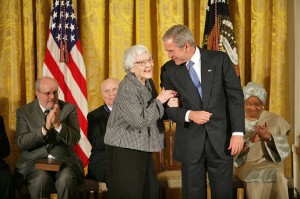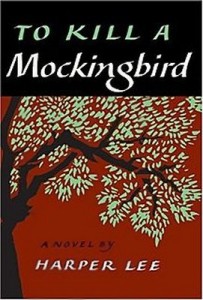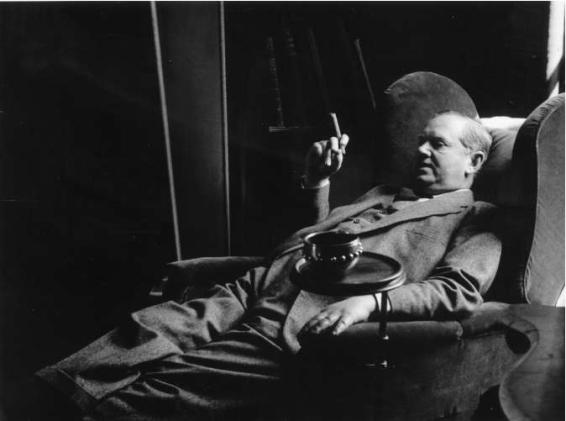
Harper Lee reunites with Boo Radley in 2007. (Image by Eric Draper.)
With the 50th anniversary of the publication of To Kill a Mockingbird upon us, some brainiac from the Daily Mail thought it was a good idea to show up unannounced and bother novelist Harper Lee for an interview, even though Lee hasn’t been interested in doing that kind of thing for more than 45 years. The reporter was politely rebuffed. Good for Lee. Back when she was open to discussing her work, Lee sat down with Roy Newquist in 1964 and covered many topics, including the then-state of contemporary writing. An excerpt:
“Roy Newquist: When you look at American writing today, perhaps American theatre too, what do you find that you most admire? And, conversely, what do you most deplore?
Harper Lee: Let me see if I can take that backward and work into it. I think the thing that I most deplore about American writing, and especially in the American theatre, is a lack of craftsmanship. It comes right down to this—the lack of absolute love for language, the lack of sitting down and working a good idea into a gem of an idea. It takes time and patience and effort to turn out a work of art, and few people seem willing to go all the way.
I see a great deal of sloppiness and I deplore it. I suppose the reason I’m so down on it is because I see tendencies in myself to be sloppy, to be satisfied with something that’s not quite good enough. I think writers today are too easily pleased with their work. This is sad. I think the sloppiness and haste carry over into painting. The search, such as it is, is on canvas, not in the mind.
But back to writing. There’s no substitute for the love of language, for the beauty of an English sentence. There’s no substitute for struggling, if a struggle is needed, to make an English sentence as beautiful as it should be.

Mockingbird: I don't care for the title. (Image by Eurico Zimbres.)
Now, as to what I think is good about writing. I think that right now, especially in the United States, we’re having a renaissance of the novel. I think that the novel has come into its own, that it has been pushed into its own by American writers. They have widened the scope of the art form. They have more or less opened it up.
Our writers, Faulkner, for instance, turned the novel into something Wolfe was trying to do. (They were contemporaries in a way, but Faulkner really carried out the mission.) It was a vision of enlargement, of using the novel form to encompass something much broader than our friends across the sea have done. I think this is something that’s been handed to us by Faulkner, Wolfe, and possibly (strangely enough) Theodore Dreiser.
Dreiser is a forgotten man, almost, but if you go back you can see what he was trying to do with the novel. He didn’t succeed because I think he imposed his own limitations.
All this is something that has been handed to us as writers today. We don’t have to fight for it, work for it; we have this wonderful literary heritage, and when I say “we” I speak in terms of my contemporaries.
There’s probably no better writer in this country today than Truman Capote. He is growing all the time. The next thing coming from Capote is not a novel—it’s a long piece of reportage, and I think it is going to make him bust loose as a novelist. He’s going to have even deeper dimension to his work. Capote, I think, is the greatest craftsman we have going.
 Of course, there’s Mary McCarthy. You may not like her work, but she knows how to write. She knows how to put a novel together. Then there’s John Cheever—his Wapshot novels are absolutely first-rate. And in the southern family there’s Flannery O’Connor.
Of course, there’s Mary McCarthy. You may not like her work, but she knows how to write. She knows how to put a novel together. Then there’s John Cheever—his Wapshot novels are absolutely first-rate. And in the southern family there’s Flannery O’Connor.
You can’t leave out John Updike—he’s so happily gifted in that he can create living human beings. At the same time he has a great respect for his language, for the tongue that gives him voice. And Peter De Vries, as far as I’m concerned, is the Evelyn Waugh of our time. I can’t pay anybody a greater compliment because Waugh is the living master, the baron of style.
These writers, these great ones, are doing something fresh and wonderful and powerful: they are exploring character in ways in which character has never been explored. They are not structured in the old patterns of hanging characters on a plot. Characters make their own plot. The dimensions of the characters determine the action of the novel.”




